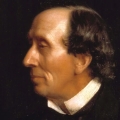
Poverty and humility lead to heaven - Brothers Grimm
Poverty and humility lead to heaven
A fairy tale by the Brothers Grimm
There was once a King's son who went out into the world, and he was full of thought and sad. He looked at the sky, which was so beautifully pure and blue, then he sighed, and said, "How well must all be with one up there in heaven!" Then he saw a poor gray-haired man who was coming along the road towards him, and he spoke to him, and asked, "How can I get to heaven?" The man answered, "By poverty and humility. Put on my ragged clothes, wander about the world for seven years, and get to know what misery is, take no money, but if thou art hungry ask compassionate hearts for a bit of bread; in this way thou wilt reach heaven."
Then the King's son took off his magnificent coat, and wore in its place the beggar's garment, went out into the wide world, and suffered great misery. He took nothing but a little food, said nothing, but prayed to the Lord to take him into his heaven. When the seven years were over, he returned to his father's palace, but no one recognized him. He said to the servants, "Go and tell my parents that I have come back again." But the servants did not believe it, and laughed and left him standing there. Then said he, "Go and tell it to my brothers that they may come down, for I should so like to see them again." The servants would not do that either, but at last one of them went, and told it to the King's children, but these did not believe it, and did not trouble themselves about it. Then he wrote a letter to his mother, and described to her all his misery, but he did not say that he was her son. So, out of pity, the Queen had a place under the stairs assigned to him, and food taken to him daily by two servants. But one of them was ill-natured and said, "Why should the beggar have the good food?" and kept it for himself, or gave it to the dogs, and took the weak, wasted-away beggar nothing but water; the other, however, was honest, and took the beggar what was sent to him. It was little, but he could live on it for a while, and all the time he was quite patient, but he grew continually weaker. As, however, his illness increased, he desired to receive the last sacrament. When the host was being elevated down below, all the bells in the town and neighbourhood began to ring. After mass the priest went to the poor man under the stairs, and there he lay dead. In one hand he had a rose, in the other a lily, and beside him was a paper in which was written his history.
Then the King's son took off his magnificent coat, and wore in its place the beggar's garment, went out into the wide world, and suffered great misery. He took nothing but a little food, said nothing, but prayed to the Lord to take him into his heaven. When the seven years were over, he returned to his father's palace, but no one recognized him. He said to the servants, "Go and tell my parents that I have come back again." But the servants did not believe it, and laughed and left him standing there. Then said he, "Go and tell it to my brothers that they may come down, for I should so like to see them again." The servants would not do that either, but at last one of them went, and told it to the King's children, but these did not believe it, and did not trouble themselves about it. Then he wrote a letter to his mother, and described to her all his misery, but he did not say that he was her son. So, out of pity, the Queen had a place under the stairs assigned to him, and food taken to him daily by two servants. But one of them was ill-natured and said, "Why should the beggar have the good food?" and kept it for himself, or gave it to the dogs, and took the weak, wasted-away beggar nothing but water; the other, however, was honest, and took the beggar what was sent to him. It was little, but he could live on it for a while, and all the time he was quite patient, but he grew continually weaker. As, however, his illness increased, he desired to receive the last sacrament. When the host was being elevated down below, all the bells in the town and neighbourhood began to ring. After mass the priest went to the poor man under the stairs, and there he lay dead. In one hand he had a rose, in the other a lily, and beside him was a paper in which was written his history.
When he was buried, a rose grew on one side of his grave, and a lily on the other.
* * * * *
Fairy taleBrothers Grimm
Translations:
 Armut und Demut führen zum Himmel (German)
Armut und Demut führen zum Himmel (German) La pobreza y la humildad llevan al cielo (Spanish)
La pobreza y la humildad llevan al cielo (Spanish) Umiltà e povertà portano in cielo (Italian)
Umiltà e povertà portano in cielo (Italian) Pobreza e humildade levam ao Céu (Portuguese)
Pobreza e humildade levam ao Céu (Portuguese) Fakirlik ve Alçakgönüllülük İnsanı Cennete Götürür (Turkish)
Fakirlik ve Alçakgönüllülük İnsanı Cennete Götürür (Turkish) 贫穷和谦卑指引天堂之路 (Chinese)
贫穷和谦卑指引天堂之路 (Chinese) Armoede en deemoed leiden ten hemel (Dutch)
Armoede en deemoed leiden ten hemel (Dutch) 貧窮と謙遜は天国へ行く路 (Japanese)
貧窮と謙遜は天国へ行く路 (Japanese)
Compare two languages:






















